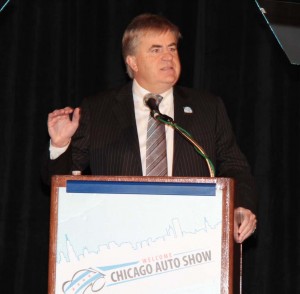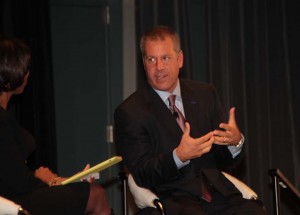The increasingly bitter debate over trade and currency manipulation unexpectedly became one of the hot topics at the Chicago Auto Show on Thursday as two industry leaders squared off over the proposed Trans-Pacific Pact, a senior Ford executive warning thousands of American jobs could be at risk.
The agreement would unite a number of nations on both sides of the Pacific Ocean in an effort to reduce trade barriers and expand trade. But the addition of Japan to the proposed TPP has set off fireworks, critics contending that the island nation routinely manipulates its currency to gain a trade advantage.
That position has only been enhanced by the recent, sharp decline in the value of the yen – and the subsequent run-up in profits of key Japanese corporations like Toyota Motor Co. The world’s largest automaker this week announced it had earned $5.2 billion during the final three months of 2013, fully half of that due to the changes in the dollar/yen exchange rate.

Toyota Vice President Bob Carter said the Japanese automaker doesn't manage its business based on the value of the yen.
“That’s a big deal,” lamented Joe Hinrichs, the third-ranking executive at Ford Motor Co. and the maker’s President of the Americas, suggesting it makes an already “formidable” competitor even more difficult to challenge.
For his part, Toyota Executive Vice President Bob Carter insisted that “We don’t manage our business on currency,” adding that Toyota is, if anything, investing billions to expand its North American operations which already produce about 70% of the vehicles the maker sells in the United States.
Carter spoke during a breakfast session marking the start of two days of media previews at the 2014 Chicago Auto Show, Hinrichs at an auto show luncheon the same day.
There is little doubt that exchange rate gaps are working in the favor of Toyota which has amassed a cash war chest of more than $40 billion – enough that investors and Japanese workers alike are calling on it to spread the wealth through dividends and pay hikes. The cash has also made it possible to expand a network of North American operations already including 14 assembly plants.
(Toyota’s Carter optimistic about sales in 2014. For more, Click Here.)
While he refrained from calling Carter’s comments disingenuous, Ford executive Hinrichs clearly disagreed about Toyota’s position on currency manipulation. He noted that the Japanese maker’s CEO Akio Toyoda had been calling for weakening the yen to increase his country’s competitiveness.
“From what I’ve seen, they’ve publicly called for a weaker currency,” said Hinrichs, noting that along with pressure from the Tokyo government there was a sudden shift from about 80 yen to the dollar to around 100, a major swing by traditional standards, especially with little significant changes in the Japanese economy to trigger such a move.
(Click Here to see how Fiat Chrysler finalized their new union.)
Ford was originally a major supporter of a trans-Pacific trade agreement but it has lately put on the brakes, joining its Detroit rivals in demanding that specific language meant to safeguard against currency manipulation be included in any agreement that might ultimately be negotiated. Without such protection, he warned, “thousands” of U.S. jobs could be lost to exports.
Worse, Hinrichs added, a flawed TPP would serve as a poor “template” for future trade agreements such as with China. Noting that the Chinese expect to soon have capacity to build more than 30 million vehicles annually, the former head of Ford of China said it would create potentially serious problems when that nation “eventually” begins exporting cars to the U.S.
(To see how extreme Toyota’s new trucks are, Click Here.)
For his part, Toyota’s Carter declined to take a specific position on the TPP, though the maker’s Japanese leaders – along with those from other Japanese corporations — have come out in favor of such an agreement.


Most CEOs care more about their multi-million dollar annual bonus that they do about U.S. jobs or the economy. Tim Cook of Apple uses Chinese slave labor to produce Apple products and as a result received $700 million in compensation. Those with no moral compass will always look out for themselves at the expense of others.